‘Everyone is now a war reporter’: Inside the newsroom of The Kyiv Independent
With Putin censoring Russia media and targeting TV stations in Ukraine, The Kyiv Independent’s editor-in-chief Olga Rudenko speaks to Rachel Sharp from western Ukraine about how the team all became war reporters overnight

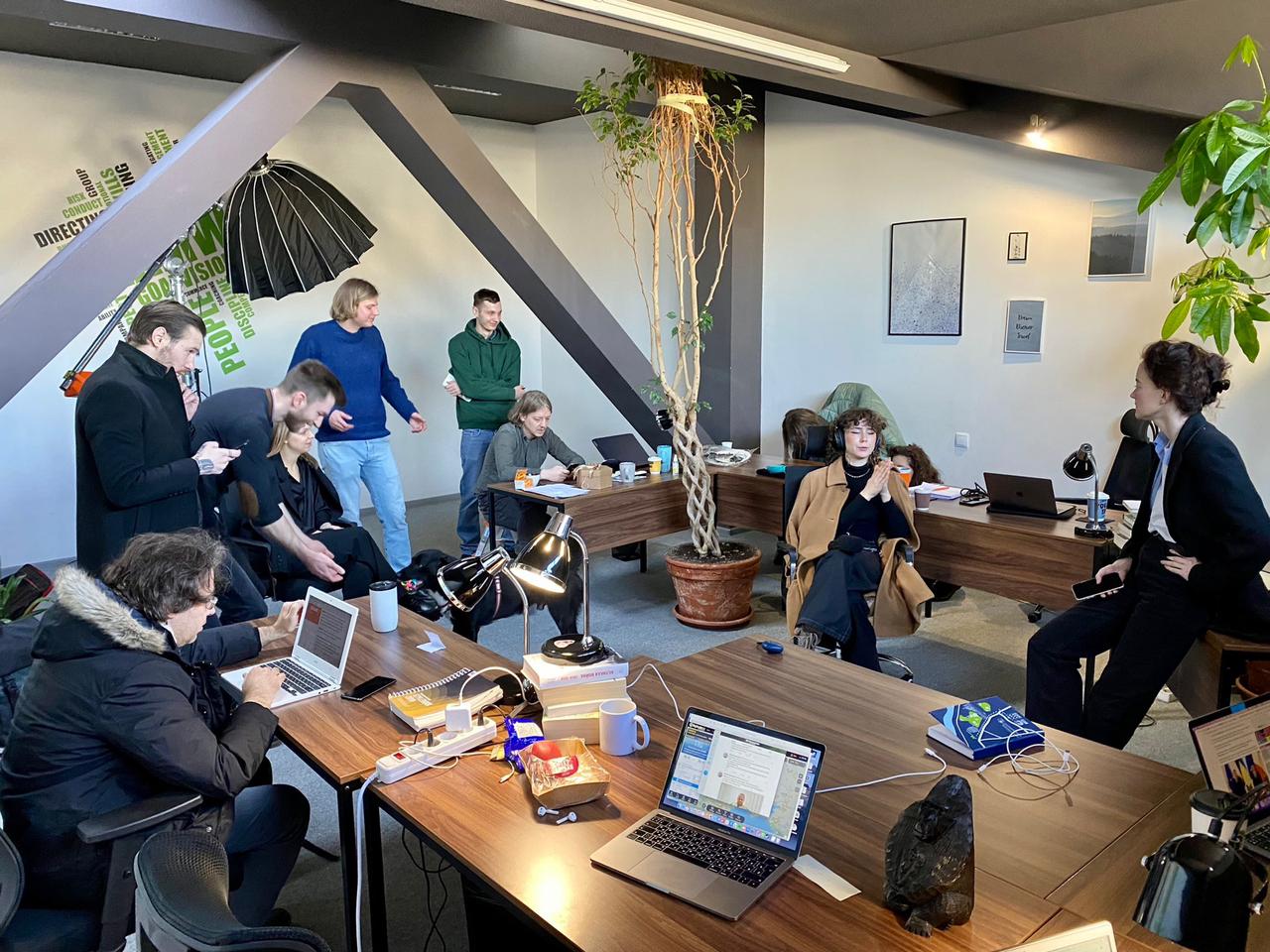
Your support helps us to tell the story
From reproductive rights to climate change to Big Tech, The Independent is on the ground when the story is developing. Whether it's investigating the financials of Elon Musk's pro-Trump PAC or producing our latest documentary, 'The A Word', which shines a light on the American women fighting for reproductive rights, we know how important it is to parse out the facts from the messaging.
At such a critical moment in US history, we need reporters on the ground. Your donation allows us to keep sending journalists to speak to both sides of the story.
The Independent is trusted by Americans across the entire political spectrum. And unlike many other quality news outlets, we choose not to lock Americans out of our reporting and analysis with paywalls. We believe quality journalism should be available to everyone, paid for by those who can afford it.
Your support makes all the difference.In the early hours of 24 February, Olga Rudenko and other members of the editorial team at The Kyiv Independent finally decided to call it a night.
They left the offices in downtown Kyiv at around 2am and walked to get taxis to take them home.
“My deputy turned to me and said with a sort of nervous laugh ‘I hope to see you guys tomorrow’,” editor-in-chief Ms Rudenko tells The Independent.
That was the last time they saw each other.
During her taxi ride home, Ms Rudenko learned that US secretary of state Antony Blinken had said he believed Russia would invade Ukraine before the night was over.
Just over two hours later, at around 4:30am, Russian state TV began broadcasting a live speech from president Vladimir Putin.
The Kyiv Independent journalists were all watching intently from their homes, messaging each other in their work group chat.
As they listened to Mr Putin speak, it quickly dawned on them where his speech was heading.
“Very soon we realised that his tone was such that it couldn’t not end with him declaring war on Ukraine,” says Ms Rudenko.
“We wrote a two-sentence news item with the headline ‘PUTIN DECLARES WAR ON UKRAINE.’
“Then he said he was starting a ‘special military operation’ in Ukraine. I activated the news item...
“And then I sank to the floor.”
Within minutes, she started to hear explosions going off outside her home.
In the two weeks since then, 516 Ukrainian civilians, including 37 children, have been killed in horrific attacks on maternity hospitals, schools and kindergartens, and more than two million refugees have been evacuated from their home country and communities have been reduced to rubble.
And, amid the threat of misinformation and disinformation from Moscow, Ukraine’s English-language media outlet The Kyiv Independent has gone from a three-month-old start-up and relative unknown in the western world to one of the leading sources of information on the war in Ukraine.
Emergency backpacks and relocation plans
Speaking to The Independent from an undisclosed location in western Ukraine, Ms Rudenko says that her team of journalists – like many Ukrainians across the country – were prepared for the possibility that Russia would declare war.
They all had their emergency backpacks packed with documents and essential items ready to go several days – some even weeks – earlier.
They had their plans in place for what they would do and where they would go if they needed to leave the capital Kyiv.
As editor-in-chief, she had sat down with each of the journalists one-on-one about their preparations.
The week leading up to the invasion, with Russia’s aggression continuing to escalate, the team was working until around 3am every night.
Ms Rudenko recalls how that Wednesday she came in and said: “We’re all so exhausted, we need to try to go home earlier and get some sleep tonight.”
But, as the day went on, the situation escalated and reports were growing that the invasion would start that night, she says.
While the declaration of war didn’t then come as a surprise, what did surprise was how terrifying those first few hours were.
“I never thought I would find myself in a city under an air strike. I didn’t think it would scare me as much as it did,” she says.
“I couldn’t move. I was standing in a room and couldn’t move. I heard this hateful, hateful speech on TV and could hear the explosions outside and I was just thinking, they are here to destroy us and kill all Ukrainians.”
Despite Russia immediately targeting the Ukrainian capital, Ms Rudenko returned to The Kyiv Independent offices the following day.
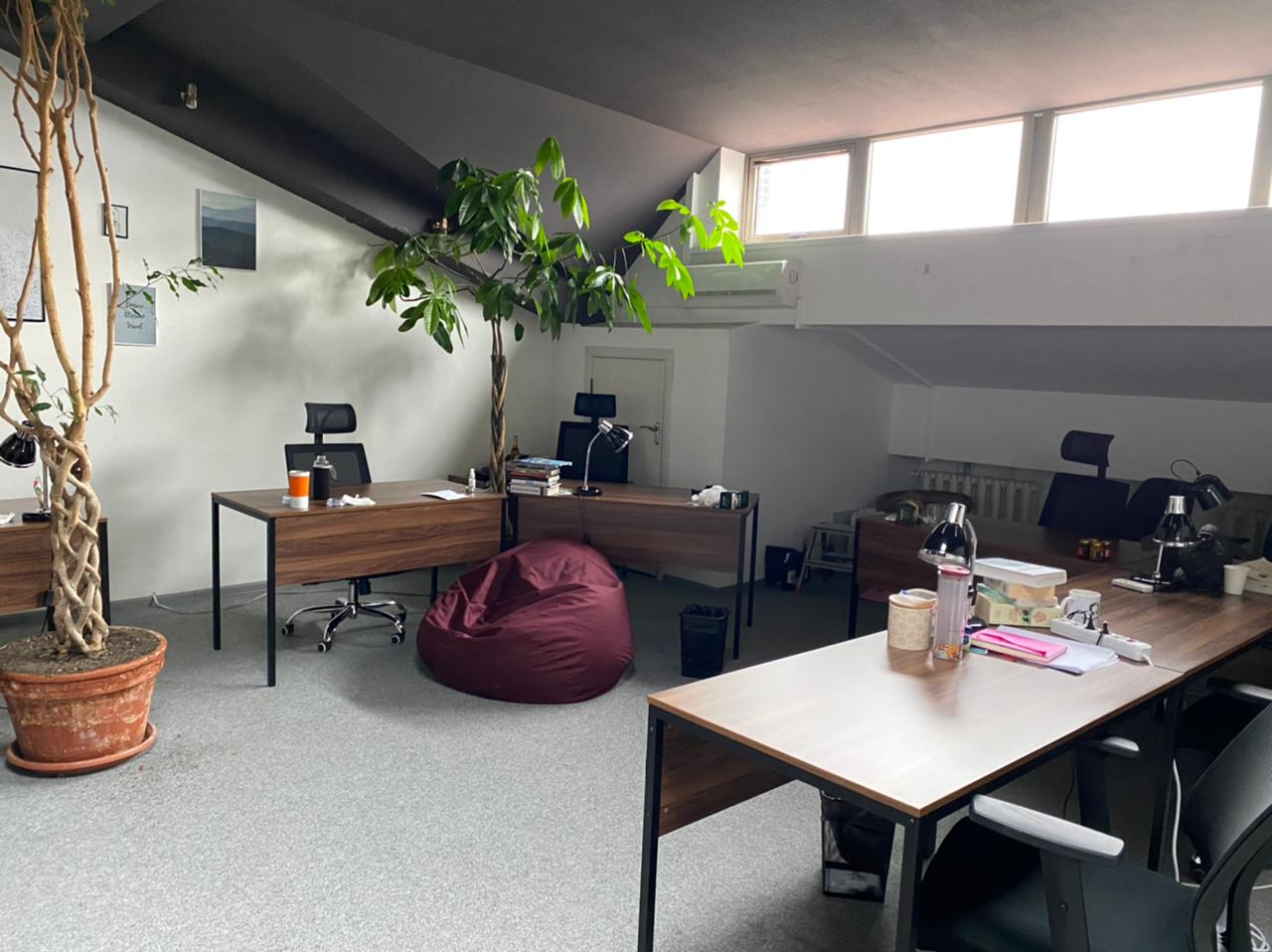
“I packed some more stuff, more clothing and then I went into work,” she says.
“I think I was trying to desperately grip onto the last bit of normality and going to the office felt like something normal.”
She was the only one there after her colleagues had started to activate their emergency plans.
“I soon realised it probably wasn’t safe for me to stay here alone and that I might also need to consider leaving the city,” she says.
She left Kyiv that night and relocated to what she says is a safer town in western Ukraine, where air raid alerts are still a daily occurrence, but it has been spared any shelling so far.
Most of The Kyiv Independent team also moved with their friends and families to various relatively safe locations outside of the capital, which continues to be a key target for Russian forces.
Three reporters, all with previous war reporting experience, voluntarily stayed behind in Kyiv where she says they are doing “amazing” work reporting in the field in “very dangerous environments”.
Only a couple of team members evacuated Ukraine for neighbouring countries. They are people who, because of their backgrounds, would be at a significant risk if they fell into the hands of the Russian military, she says.
Each and every one of their decisions about whether to leave Kyiv and where to go were “very complicated”, she adds.
Becoming war reporters
Ultimately, one of her biggest reasons for leaving was to be able to continue getting information to their readers if Russia managed to cut off internet or mobile connections in Kyiv.
“The bomb shelter that I had access to in Kyiv and where I had to go on the first day was the subway station and it doesn’t have internet connection so I couldn’t work properly,” she says.
“One of my main concerns was just becoming useless and being unable to work.”
While they have managed to avoid a major shutdown, Ms Rudenko says that even after relocating it remains a concern.
A contingency plan has been put in place if Ukraine does lose internet access, with journalists now based in neighbouring countries as well as individuals in North America ready and waiting to pick up the work.
There is also the threat of being targeted in a cyber attack.
Earlier this week, Google’s Threat Analysis Group said that it had uncovered major phishing campaigns over the past two weeks targeting users of Ukrainian media company UkrNet as well as Ukrainian and Polish government and military organisations.
The attacks were carried out by Russian hacking group Fancy Bear, which has ties to Russia’s military intelligence service GRU, and Belarusian-based hacker Ghostwriter.
“We ourselves have not been seriously targeted yet, but it is a risk,” says Ms Rudenko.
“When the war started, our website went down at one point but that was because the traffic was so heavy.”
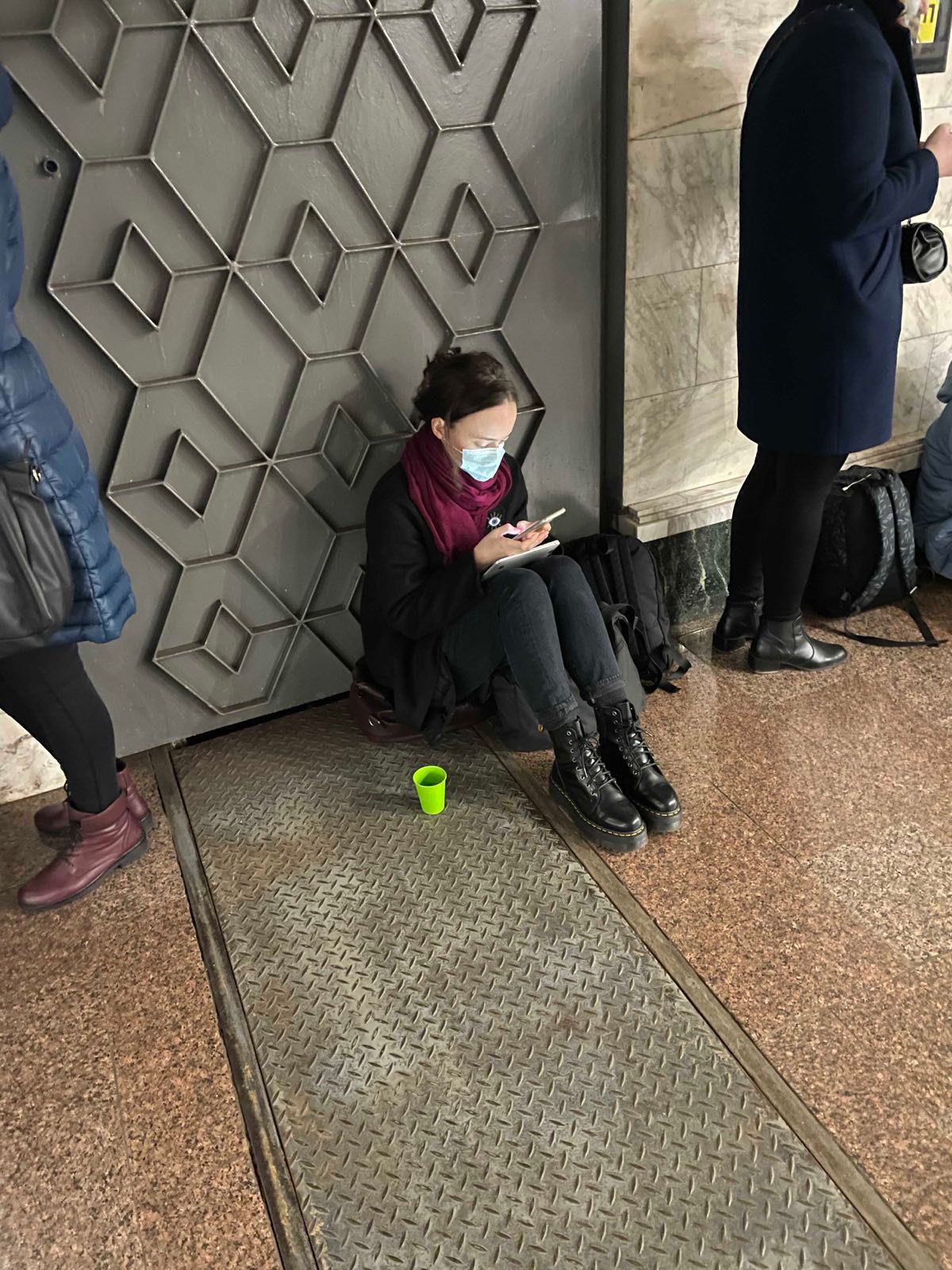
In the two weeks since the war began, its readership has skyrocketed, with the company’s Twitter page rising from 30,000 followers on 21 February to 1.7 million as of 9 March.
Journalists’ beats are a thing of the past, with each member of the small team of 20 or so now a “war reporter”.
“We are only reporting on the war now. There’s no other stories. No politics, no business, nothing else,” says Ms Rudenko.
“Everyone is now a war reporter and is covering different aspects of the war – news on the course of the war, but also things like the human tragedies, such as the group of civilians who were shot dead in a town near Kyiv when they were taking food to stray dogs at a shelter.”
Ukrainian journalists reporting on such atrocities in their home country, and living with the real fears about the safety of their loved ones, are in a “very different situation” to foreign journalists also covering the war on the ground, says Ms Rudenko.
“Many foreign journalists are doing a very good job, especially out in the field, but when they’re done they’ll leave and go back home or go on to the next hotspot,” she says. “But we’ll stay here and live here so we all have a personal stake in what’s happening.”
Not that a personal stake is detrimental to reporting, she insists. “We don’t pretend to be neutral,” she says. “We all know who the aggressor is and who the victims are. There’s no neutrality – even if you’re not Ukrainian.”
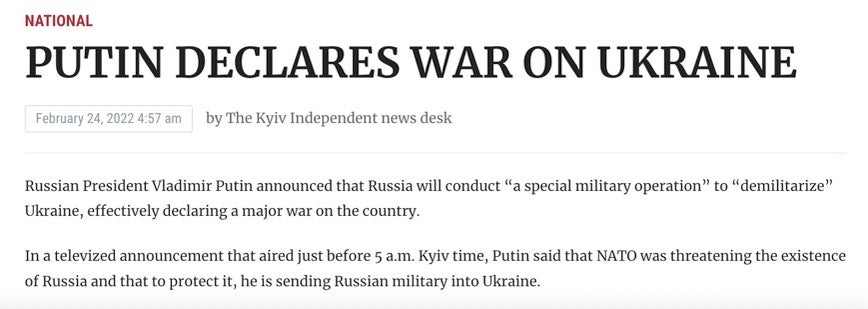
Instead, The Kyiv Independent has risen to the challenge of wading through the widespread misinformation circulating online, and the disinformation coming from Russia’s propaganda machine, to report the truth of the war to the English-speaking world.
“The Russian state has thrown millions, if not billions of dollars into spreading propaganda to the English-speaking world,” she says.
“We are a team of 20-something people and there’s other small teams and independent media also trying as much as possible to get the truth out to the world.”
Battling Putin’s propaganda
Since Mr Putin launched his full-scale invasion of Ukraine two weeks ago, he has increasingly censored independent media in Russia and attempted to control the narrative reaching the Russian population.
Independent media outlets including Meduza and TV Rain were shut down and liberal radio station Ekho Moskvy was taken off the air by Russian officials, who accused them of spreading “deliberately false information” about Russia’s assault on Ukraine.
Rain TV initially vowed to continue to report through its social media channels, until Russia blocked Facebook.
The TV channel’s editorial team ended up fleeing the country last week amid fears for their safety as the Kremlin upped the threats on journalists who dare to stray from the propaganda pushed by the state-run media.
Journalists have been banned from using terms such as “invasion”, “war” or “attack” to describe the war on Ukraine.
And Mr Putin introduced a new law threatening journalists with 15 years in prison if they report “fake news”, which to Moscow is anything that doesn’t toe the line of his propaganda.
Several western news outlets have paused their operations in Russia in response to the new law.
The New York Times announced on Tuesday that it was pulling all journalists out while CNN and ABC have stopped broadcasting from the country.
Seeing independent journalism shuttered in Russia is a “horrible thing” for the future of the country, says Ms Rudenko, but she feels it was inevitable after watching Russian media comply with Mr Putin’s rules over time.
“They saw this coming when the Russian government labeled journalists foreign agents and said there were words they were not allowed to use. Every time the Russian government put out another stupid rule, they were complying with it… so when the final hit came – which was only a matter of time – they now have no media.”
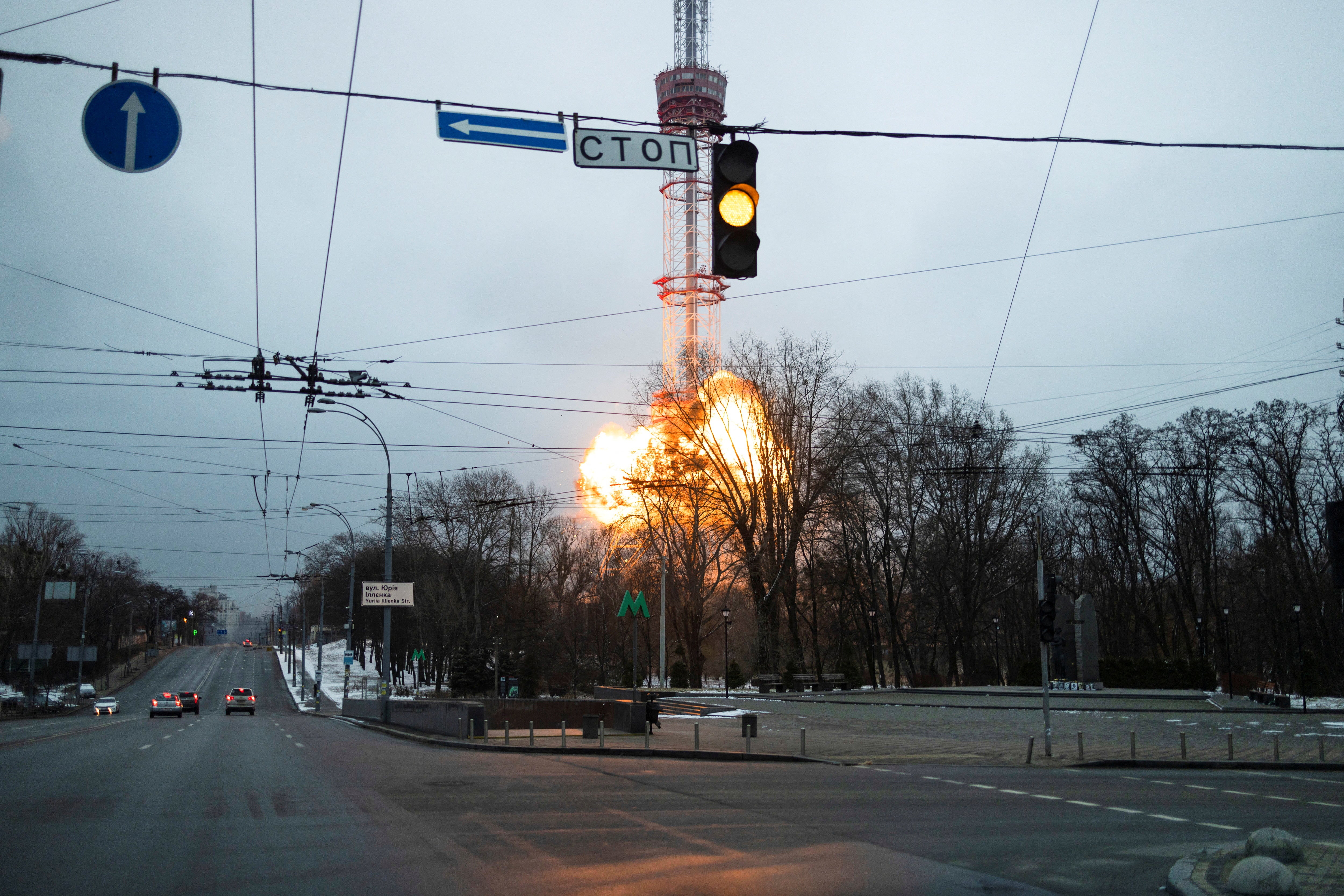
The Kremlin’s targeting of journalists that dare to stray from its narrative is already spreading from Russia into Ukraine.
Yevhenii Sakun, a Ukrainian journalist for news agency EFE and cameraman for TV channel LIVE, was one of five people killed when Russian forces targeted a TV tower in Kyiv on 1 March with shelling.
Days later, two journalists for Sky News were shot in an ambush by Russian forces. Luckily, they survived.
“Russia has targeted TV towers in other areas too, not just in Kyiv,” says Ms Rudenko.
“It’s a very clear demonstration of something we already knew: that censorship is a key part of Russia’s regime and Russia’s war and they definitely don’t think journalists shouldn’t be targeted.”
Despite accepting that journalists are among those at great risk if captured by Russian forces, Ms Rudenko insists she and her team are not afraid. “If we find ourselves in occupied territory I do realise that we can be targeted as journalists. But that’s a risk that everyone realises. We all talked about it before the invasion started… everyone understands.”
The fight for independent journalism
The Kyiv Independent is made up of a team of journalists who used to work for the Kyiv Post, Ukraine’s long-running and now defunct English language paper.
The journalists were all fired from the paper in November over a conflict with the owner’s direction for the brand, which the editorial team said infringed on its editorial independence.
That same month, the group of journalists together launched The Kyiv Independent and Ms Rudenko was picked by the staff to be its editor-in-chief.
Part of its commitment to editorial independence is a pledge on its website reading: “The publication will serve its readers and community, and nobody else.”
And – despite him being widely praised for his leadership during the war – that also includes president Volodymyr Zelensky.
“There’s a general opinion among Ukrainian journalists that now is not the time to criticise the government’s actions, but to support it now and share that criticism after the war,” she says.
“I think most of us think the president is doing really well, but of course we still need to stay sober to the truth, to be reliable in a time of war.
“If the Ukrainian government comes out tomorrow and says this is black when it’s white we’re going to say it’s white.
“We support our country and the president, but we are journalists and we are not journeying into state propaganda. If we deny that and go after stories that are true, when the war ends and we win – and I’m sure we will win – I hope we have a world where the truth still matters.”
Wading through misinformation
Russia’s propaganda machine aside, getting reliable information in a time of war can be challenging, Ms Rudenko admits, adding that there is also a lot of “misinformation unintentionally spread by regular Ukrainians – and maybe in some cases disinformation spread by them as fantastic stories to lift the spirits.”
She points to one “urban legend” that has been reported by some media outlets of a Ukrainian grandmother who allegedly took down a Russian drone by throwing a jar of pickles at it.
“Maybe it happened, maybe it didn’t. But we can’t confirm it so we are not writing about it,” she says. “We are trying to look through a sober lens and to be careful with facts and not share what might not be a story.
“We don’t need to share stuff like that to highlight the bravery and determination – the Ukrainian military and people are already doing amazing things and the truthful fact-checked stories of bravery and determination are there.”
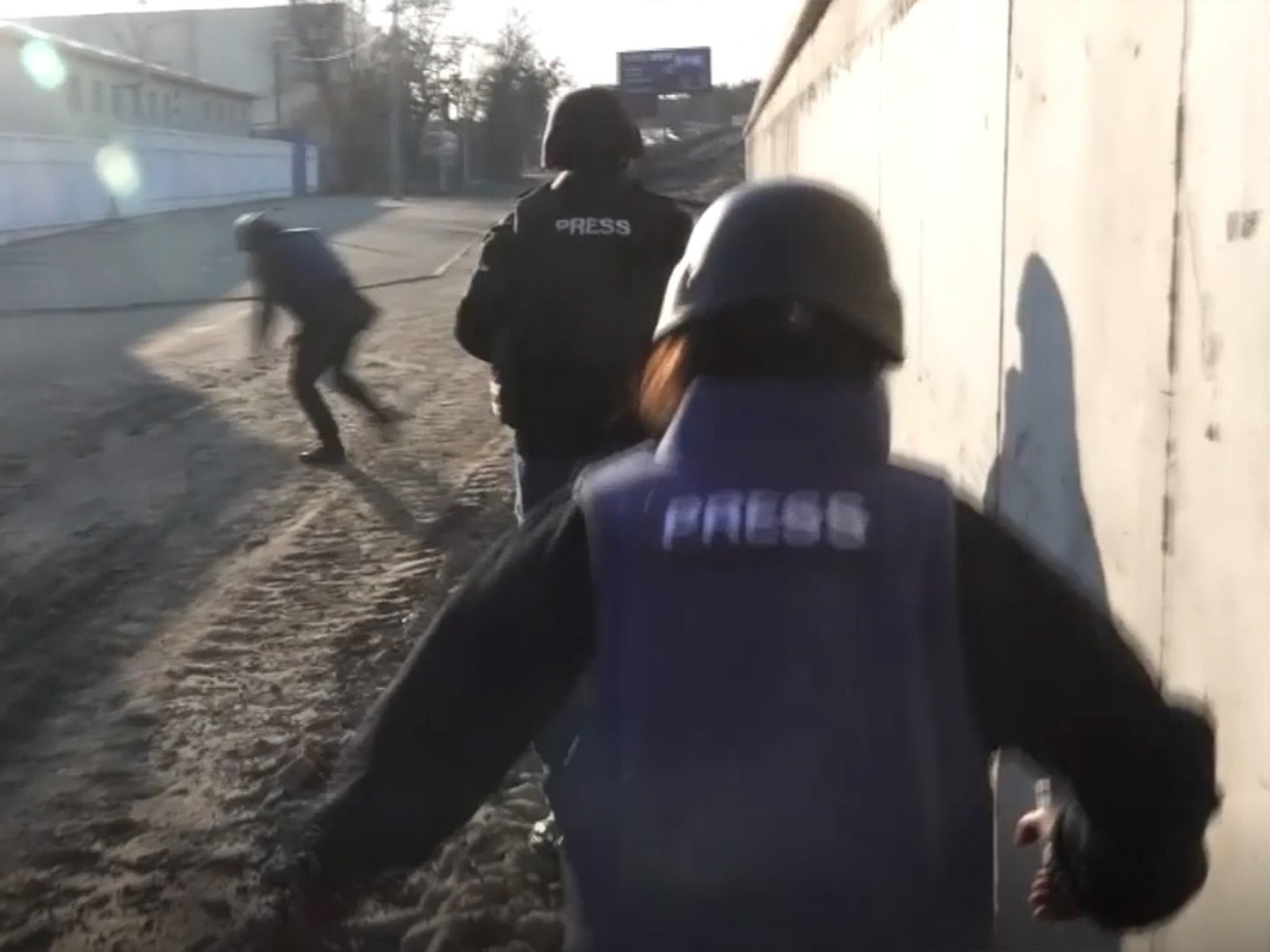
Verifying information is a challenge though, with social media overloaded with unverified accounts, certain cities encircled by Russia having next to no journalists present on the ground and reporters often relying on what the government or officials say.
Telegram has become the platform of choice for many officials to communicate but Ms Rudenko says that channels are often anonymous.
It is important to get to the bottom of the original source, she says, and even then to ask: “Does it make sense that the person saying it has access to that information?
“Even when it’s from politicians, is it in their scope and area of work?”
The Kyiv Independent relies on fundraising from readers and donors.
Before the war began, a GoFundMe was set up to support its journalists with their work.
In the two weeks since the attack was launched, donations have flooded in, reaching more than £1.2m as of Wednesday night as the outlet becomes one of the western world’s key sources of information on Ukraine.
A second GoFundMe has also been launched to help other independent Ukrainian outlets keep going as they lose revenue streams, such as advertising, while facing extra costs on security measures and relocation costs for their reporters covering the war.
Beyond donating, Ms Rudenko says that western media can also do more by “calling the war for what it is”.
“I really want the western media to not fall for Russia’s narrative, to call this what it is – a war and an invasion, not a crisis, not a military operation,” she says. “As journalists we need to call things for what they are and not what Putin calls it.”
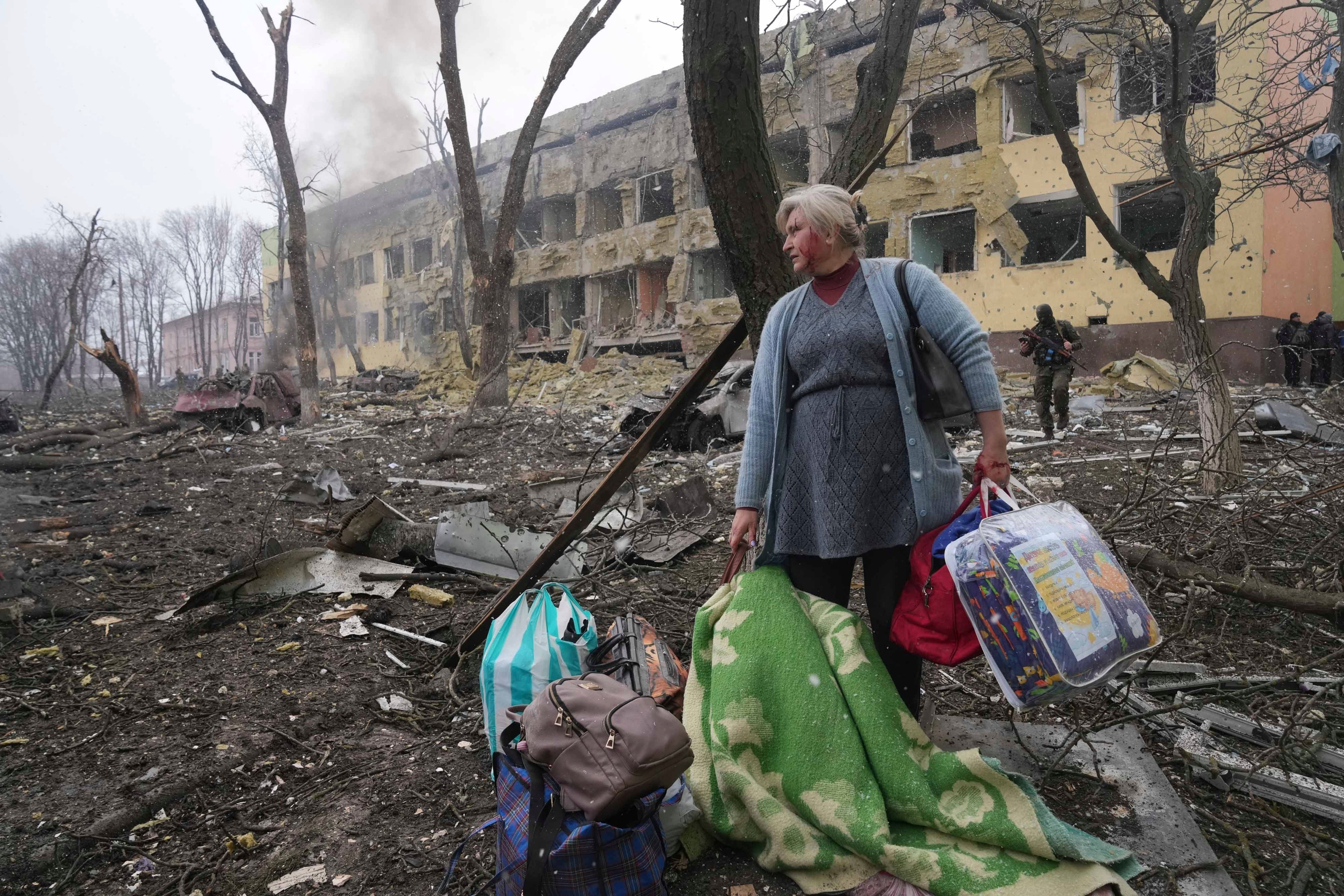
As they carry on with their work, Ms Rudenko says that The Kyiv Independent editorial team will have a big decision to make in the near future.
“We need to decide whether it makes sense for us to set up a temporary office in western Ukraine,” she says. “Or if Kyiv becomes less dangerous do we return to our office there. Everyone wants to go back to Kyiv, we all talk about it.”
For now, as they remain in their locations across Ukraine, Ms Rudenko says she is amazed at how what was a small, four-month-old start-up has grown into a team of war reporters overnight.
“They are covering atrocities and murders of civilians, and it takes its toll on all of us, but everyone is holding up so bravely,” she said.
“At a time like this, in the tragedy of war, it’s amazing how people remain motivated and dedicated.
“You really see how the mission and meaning of being a journalist is so important and is so clear to them right now.”
The Independent has a proud history of campaigning for the rights of the most vulnerable, and we first ran our Refugees Welcome campaign during the war in Syria in 2015. Now, as we renew our campaign and launch this petition in the wake of the unfolding Ukrainian crisis, we are calling on the government to go further and faster to ensure help is delivered. To find out more about our Refugees Welcome campaign, click here. To sign the petition click here. If you would like to donate then please click here for our GoFundMe page.



Join our commenting forum
Join thought-provoking conversations, follow other Independent readers and see their replies
Comments